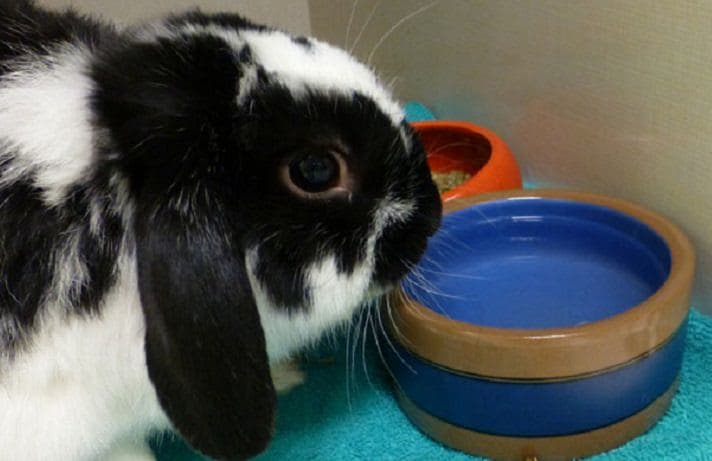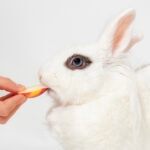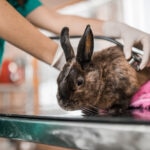What To Do When You See Red In Your Rabbit’s Urine

Photo by Chewy
The medical term for the presence of blood in the urine is hematuria. It is a condition that is seen fairly often in pet rabbits and can be due to a number of medical disorders. These problems may involve the urinary system directly or, in the case of unspayed female rabbits, may be the result of a diseased reproductive tract. In order to understand the implications of hematuria, it is helpful to have some knowledge about the anatomy of the urinary system of rabbits and how it functions.
The Rabbit Urinary System
Like humans, rabbits have two kidneys—one on either side of the body. The kidneys have many important functions, such as conserving water, regulating blood pressure, maintaining proper salt balance, activating vitamin D and producing hormones that stimulate the production of red blood cells by the bone marrow. However, the kidney function that most people are familiar with is the production of urine as a means for eliminating the waste products created by the body. Once the urine has been produced by the kidney, it flows down a narrow tube known as the ureter into the bladder. When full, the bladder empties the urine into the litter box via the urethra. In male rabbits, the urethra travels through the penis while in female rabbits the urethra terminates within the lumen of the vagina.
Rabbit urine varies from that of other species in a number of ways. First, rabbits have a limited ability to concentrate their urine and thus produce relatively dilute urine compared to other animals. On average, rabbits produce about 130 milliliters of urine per kilogram of body weight. In comparison, dogs and cats produce an average of about 40 milliliters of urine per kilogram of body weight. To replace the water that is lost in the urine, rabbits must intake relatively larger quantities of water in order to prevent dehydration. On average, rabbits consume more than twice the amount of water per kilogram of body weight than dogs or cats.
Second, rabbits rely on their kidneys to remove excess calcium from the blood while most mammals utilize their digestive tract for this purpose. Calcium is a mineral that is well-known for playing an important role in maintaining the normal strength of bones and teeth. However, it also aids in blood clotting, proper functioning of nerves and contraction of muscle fibers, including the muscle fibers found in the heart. It has been reported that the amount of calcium found in rabbit blood is directly proportional to the amount of calcium the rabbit consumes and, in general, rabbits naturally have higher levels of blood calcium than other mammals.
Maintaining proper calcium levels is critical. Too little calcium leads to soft bones, improper development of teeth and muscle weakness. However, too much calcium accumulation within the body can be equally deleterious to the health of the rabbit. It can lead to cardiac arrhythmias, disruption of nerve function and mineralization of tissues. In order to maintain healthy calcium levels, rabbits rely on the balance between the absorptive capacity of their digestive tract and the ability of the kidneys to eliminate calcium. Because the kidneys are an important means for removing calcium, rabbits normally have many calcium crystals in their urine. These crystals are the reason why normal rabbit urine often appears creamy and thick, and why owners often see white deposits in the litter box.
Finally, normal rabbit urine can vary in color from a light yellow to a shade of deep rust. The red/orange color is believed to be due in part to harmless plant pigments called porphyrins that are ingested by the rabbit and excreted by the kidneys. The foods that have been reported to elicit the greatest change in urine color include broccoli, cabbage, dandelion, parsley and carrots. However, rabbits that do not receive these food items can also pass red/orange urine, so there is likely more than just diet influencing urine color.
Red Urine: Is It Blood?
When a red color change is noted by an owner, the first step is to determine whether or not it is truly due to the presence of blood. As mentioned earlier, porphyrin pigments can make the urine appear red, which can be mistaken for hematuria. The simplest test to determine whether or not a rabbit has hematuria is to perform a urinalysis.
In order to obtain a urine sample, veterinarians often recommend a cystocentesis. During this procedure, urine is obtained by passing a needle through the abdominal wall into the bladder. This prevents the sample from being contaminated by bacteria and debris from the urethra or, in the case of females, the vagina.
Microscopic examination of a urine sample can quickly identify the presence of red blood cells. If hematuria is confirmed, it is important to determine the source of the bleeding and the underlying cause. For instance, a rabbit may have suffered a trauma leading to bleeding from the urinary system. Occasionally, an infection may develop, causing inflammation and bleeding in the urinary tract. While conditions such as cancer of the urinary system have been infrequently reported, the two most common causes for hematuria involving the urinary system are urinary calculi and hypercalciuria.
Urinary Calculi And Hypercalciuria
Urinary calculi are large solid stones, also known as uroliths, that can be found anywhere within the urinary tract. In rabbits, these calculi are typically comprised of calcium salts, especially calcium oxalate, calcium phosphate and calcium carbonate. Once formed, the calculi traumatize the surrounding tissue, predisposing them to infection, inflammation and bleeding. If they become lodged within the narrow tubes of the ureters or urethra, these stones can lead to life-threatening blockage as normal urine flow is halted.
Hypercalciuria is another differential for hematuria. This condition is similar to urinary calculi in that the calcium carbonate crystals accumulate into solid stones but these stones are very small, no larger than a grain of sand. These numerous, sandlike particles result in a thick, pastelike material most often referred to as “sludge.” While sludge can occur in any part of the urinary system, it seems to develop most commonly within the bladder.
Why Does It Happen?
Several theories attempt to explain why urinary calculi and hypercalciuria develop. One possibility may be the presence of a urinary tract infection. The presence of bacteria or the inflammatory response by the body to the infection may alter the likelihood of the calcium crystals sticking together. While performing a bacterial culture on the urine can be an important diagnostic tool, it is sometimes difficult to determine if the bacteria present was ultimately the cause of the problem or occurred as a result of the chronic irritation and damage to the urinary system by the stone or sludge. It is also well-known that these conditions can occur even without an infection being present.
Another suggestion is that stones and sludge may develop due to a higher concentration of calcium crystals in the bladder secondary to the intake of excess calcium. The excess dietary calcium may be derived from foodstuffs, such as high-calcium greens, alfalfa pellets and hay, or come from dietary supplements, such as mineral blocks. However, the true influence of the diet on the development of urinary calculi or hypercalciuria is still being investigated. In one study, rabbits fed excess amounts of calcium did not develop calculi or sludge. This does not completely discount the role of dietary calcium but may suggest that the development of urinary calculi and hypercalciuria may involve a combination of factors.
Chronic dehydration and urine retention may also predispose rabbits to the development of uroliths and sludge. When dehydrated, rabbits attempt to conserve body water and therefore release less water into the urine. This results in a higher concentration of calcium crystals in the urine, thus increasing the chance that they will interact and bind together. When urine is retained, this can also lead to a situation where calcium crystals have a greater chance to adhere to one another. In fact, one study demonstrated that temporary obstruction of the ureters caused kidney stone formation in 100 percent of rabbits tested. Thus, any condition that prevents rabbits from voiding urine normally may predispose them to problems. For example, diseases or injury of the spinal cord or peripheral nerves that impair proper functioning of the bladder can lead to urine retention and increase the risk of urolith or sludge formation.
Lifestyle has been repeatedly demonstrated to influence the development of urinary system problems. The risk for urinary calculi and hypercalciuria is greatly increased in rabbits that are overweight and sedentary. The lack of movement may allow all of the calcium crystals present in the urine to settle at the bottom of the bladder, much like mud at the bottom of a pond. With time, more and more precipitate accumulates, which weighs on the bladder and causes painful distension. The rabbit is then even more unlikely to want to move around, becoming more sedentary—which leads to a worsening of the condition. In severe conditions, the weight of the sludge stretches the bladder far beyond its normal size. This prevents proper emptying of the bladder, subsequent urine retention and escalation of the problem.
When Blood In The Urine Isn’t Urinary At All
Sometimes blood that is seen in the urine does not come from the urinary system at all. As stated earlier, the urethra of the female rabbit opens along the wall of the vagina. Therefore, material present in the vagina can mix with urine that is voided. Diseases such as cancer and venous aneurysms can cause bleeding from the reproductive tract. The cancer rate of intact female rabbits has been estimated to be as high as 60 percent in those more than 4 years of age. This is the one reason why spaying females is strongly recommended by veterinarians. Aneurysms have also been reported to occur within the uterine horns and vagina.
An aneurysm is a balloon-like dilation of a blood vessel that can spontaneously rupture, causing blood loss. Blood from the reproductive tract ultimately travels to the vagina and is swept up by the urine, causing hematuria. In order to determine where the blood originates, laboratory testing is advised.
Signs Of Trouble
The clinical signs of urinary calculi and hypercalciuria are similar. In addition to blood in the urine, these rabbits often demonstrate reduced or absent appetite, reduced stool output, difficulty urinating, weight loss, reduced energy and signs of pain that include teeth grinding, reluctance to move and a hunched posture.
One of the secondary complications of urinary calculi and hypercalciuria is the development of urine scald. As the rabbit becomes more uncomfortable with the developing urinary tract problems, the ability to assume the correct position when voiding urine is reduced, and often the direction of the urine flow as it leaves the urethra is altered. This leads to soiling of the fur and skin. Urine scald is painful and leads to bacterial infections of the skin. Other conditions such as arthritis, neurological deficits and hock sores can also lead to urine scald. Rabbits displaying these signs should always receive proper veterinary attention.
Making The Diagnosis
Once hematuria has been confirmed by a urinalysis, the next step is to determine the source and cause of the bleeding. Radiographs (X-rays) are one of the primary methods for detecting the presence of urinary calculi and hypercalciuria in the kidneys, ureters, bladder and urethra. However, they are limited with respect to detailed examination of soft tissues. Ultrasonography allows for better detection of soft tissue diseases involving the urinary system and reproductive tract.
Treatment
The treatment options available to rabbits with hematuria vary depending on the cause, severity and location of the condition. If the urinary system is involved, a complete blood panel and urinalysis is recommended to assess the overall health of the renal system and help determine which treatment option is safest for your rabbit.
Medical Management
For cases of hematuria due to the presence of sludge or tiny uroliths, a non-surgical approach may be appropriate. This may involve intravenous or subcutaneous fluids to increase the water portion of the urine. Manual expression of the bladder by a veterinarian can help the rabbit pass the sand. Many times these rabbits require sedation and catheterization of the urethra followed by pain relief and antibiotics.
Surgery
If the blood is found to originate from the reproductive tract of an intact female, then surgery is indicated and often curative. Surgery to remove uroliths can be very challenging depending on the location of the stone. Bladder stones can often be retrieved relatively easily. Removal of a kidney may be necessary if a stone has formed in that tissue and has caused irreversible damage. It is critical to the survival of the rabbit to ensure that the opposite kidney is still functional before such a procedure occurs. Large uroliths in the urethra require removal before life-threatening obstruction develops.
Lithotripsy
This technique uses shock waves produced outside of the body to fragment uroliths into smaller pieces that are easier to pass through the urinary system. Currently, this technique is in the experimental stage with respect to treating rabbits. In the future, this may become an alternative method for treating rabbit uroliths noninvasively.
Prevention
Currently, dietary modifications remain the most important recommendation for preventing the reoccurrence of stones and sludge. Reducing the intake of calcium will decrease blood calcium levels and the amount of calcium excreted by the kidneys. Encouraging water intake helps maintain hydration and dilute the urine. In general, encouraging rabbits to exercise and maintain a healthy body condition can help reduce risk of disease. Veterinarians may provide long-term medications, such as diuretics, subcutaneous fluids or potassium citrate. The potassium citrate acts to reduce crystal formation.
Doing What’s Best
Hematuria should always be cause for concern. In order to determine the location and severity of the disease, laboratory testing is often necessary. By working with an experienced rabbit veterinarian, you can ensure that your pet receives proper help and hopefully reduce the chance of problems in the future.
By: Leticia Materi, PhD, DVM
Excerpt from the annual magazine Rabbits USA, 2014 issue, with permission from its publisher, Lumina Media.



